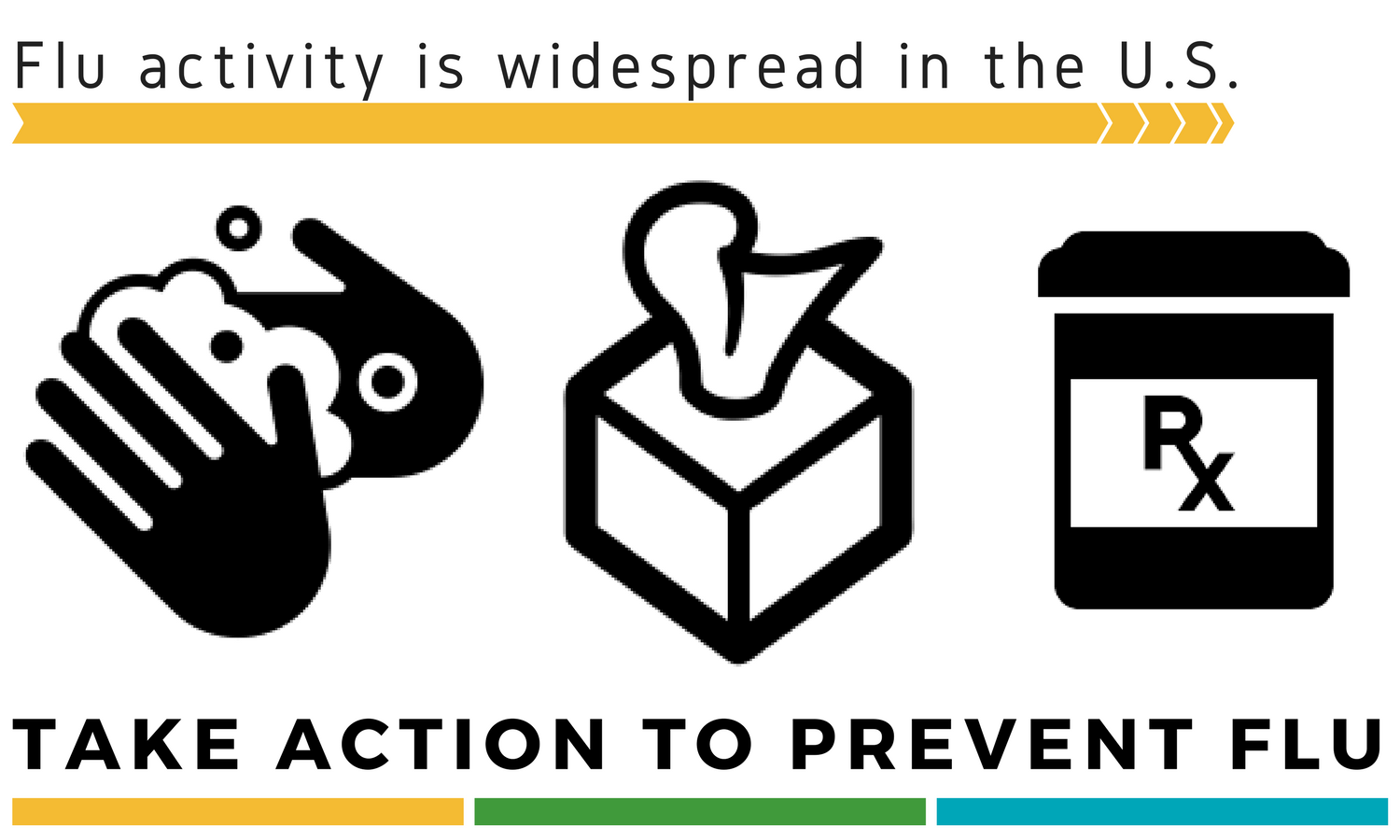Protect yourself and others from influenza (flu) this season.
This year’s flu season is more widespread and robust than in previous years. As influenza quickly spreads throughout the country and state of Wisconsin, please adhere to protective strategies, seek medical care within 48 hours of symptoms, and prevent the spread of flu to others.
If you experience severe and/or a sudden onset of flu signs and symptoms, set up an appointment with a medical provider as soon as possible.
Protective strategies

- Wash hands often with soap and water.
- Disinfect surfaces, doorknobs, and all electronic devices.
- Avoid close contact with sick individuals.
- If you are sick with flu-like symptoms, stay home except to get medical care.
- Cover your nose and mouth with a tissue when you cough or sneeze.
What happens in the body when someone has the flu?
Influenza viruses usually infect the respiratory tract (i.e., the airways of the nose, throat and lungs). As the infection increases, the body’s immune system responds to fight the virus infection. This results in inflammation that can trigger respiratory symptoms such as cough and sore throat. The immune system response can also trigger fever and cause muscle or body aches. When infected persons cough, they can spread influenza viruses in respiratory droplets to someone next to them; persons can also become infected through contact with infectious secretions or contaminated surfaces.
What should I do if I get sick with the flu?
Most people with the flu have mild illness and do not need medical care or antiviral drugs. If you get sick with flu symptoms, in most cases, you should stay home and avoid contact with other people except to get medical care.
If, however, you have symptoms of flu and are in a high risk group, or are very sick or worried about your illness, contact your health care provider (doctor, physician assistant, etc.). There are drugs your doctor may prescribe for treating the flu called “antivirals.” These drugs can make you better faster and also may prevent serious complications.
Antiviral drugs are prescription drugs that can be used to treat flu illness. People at high risk of serious flu complications (such as children younger than 5 years, adults 65 years of age and older, pregnant women, people with certain long-term medical conditions, and residents of nursing homes and other long-term care facilities) and people who are very sick with flu (such as those hospitalized because of flu) should get antiviral drugs. Other people can be treated with antivirals at their health care professional’s discretion. Treating high risk people or people who are very sick with flu with antiviral drugs is very important. Studies show that prompt treatment with antiviral drugs can prevent serious flu complications. Prompt treatment can mean the difference between having a milder illness versus very serious illness that could result in a hospital stay.
Treatment with antivirals works best when begun within 48 hours of getting sick, but can still be beneficial when given later in the course of illness. Antiviral drugs are effective across all age and risk groups. Studies show that antiviral drugs are under-prescribed for people who are at high risk of complications who get flu. Three FDA-approved antiviral medications are recommended for use during the 2017-2018 flu season: oseltamivir (available in generic versions and under the trade name Tamiflu®), zanamivir (Relenza®), and peramivir (Rapivab®). More information about antiviral drugs can be found at Treatment – Antiviral Drugs.
Information retrieved from the CDC.
Are there medicines to treat the flu?
Yes. There are drugs your doctor may prescribe for treating the flu called “antivirals.” These drugs can make you better faster and may also prevent serious complications. See Treatment – Antiviral Drugs for more information.
How long should I stay home if I’m sick?
The CDC recommends that you stay home for at least 24 hours after your fever is gone except to get medical care or other necessities. Your fever should be gone without the use of a fever-reducing medicine, such as Tylenol®. You should stay home from work, school, travel, shopping, social events, and public gatherings.
When to seek immediate medical care
Seek immediate medical care if the sick person experiences:
- Difficulty breathing or shortness of breath
- Purple or blue discoloration of the lips
- Pain or pressure in the chest or abdomen
- Sudden dizziness
- Confusion
- Severe or persistent vomiting
- Seizures
- Flu-like symptoms that improve but then return with fever and worse cough
![]()



Recent Comments